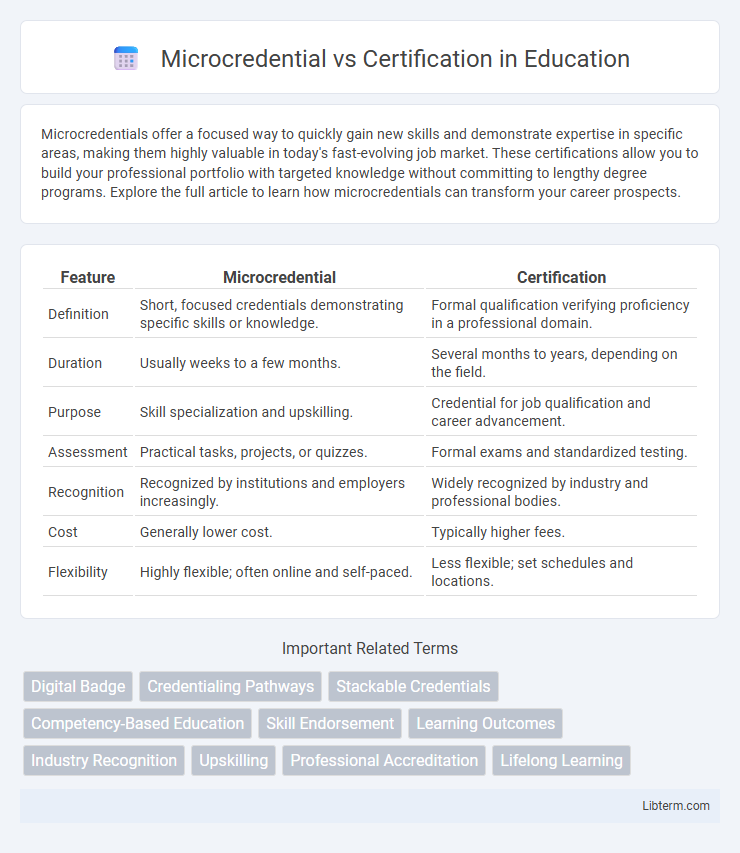Microcredentials offer a focused way to quickly gain new skills and demonstrate expertise in specific areas, making them highly valuable in today's fast-evolving job market. These certifications allow you to build your professional portfolio with targeted knowledge without committing to lengthy degree programs. Explore the full article to learn how microcredentials can transform your career prospects.
Table of Comparison
| Feature | Microcredential | Certification |
|---|---|---|
| Definition | Short, focused credentials demonstrating specific skills or knowledge. | Formal qualification verifying proficiency in a professional domain. |
| Duration | Usually weeks to a few months. | Several months to years, depending on the field. |
| Purpose | Skill specialization and upskilling. | Credential for job qualification and career advancement. |
| Assessment | Practical tasks, projects, or quizzes. | Formal exams and standardized testing. |
| Recognition | Recognized by institutions and employers increasingly. | Widely recognized by industry and professional bodies. |
| Cost | Generally lower cost. | Typically higher fees. |
| Flexibility | Highly flexible; often online and self-paced. | Less flexible; set schedules and locations. |
Understanding Microcredentials and Certifications
Microcredentials focus on specific skills or competencies acquired through short, targeted learning experiences, often endorsed by educational institutions or industry leaders to validate expertise in niche areas. Certifications typically require comprehensive assessment and meet standardized criteria, providing formal recognition of proficiency or qualification within professional fields. Understanding the nuanced differences helps learners choose credentials aligned with career goals and industry demands for verified skillsets.
Key Differences Between Microcredentials and Certifications
Microcredentials typically focus on specific skills or competencies and are often shorter in duration, while certifications assess broader knowledge and professional standards with formal exams. Microcredentials provide flexible, stackable learning pathways suited for continuous skill development, whereas certifications usually require meeting industry-recognized criteria for qualification. Employers often view certifications as proof of expertise, while microcredentials demonstrate targeted skill acquisition aligned with evolving job market demands.
Benefits of Microcredentials
Microcredentials offer targeted skill validation that is often more flexible and affordable than traditional certifications. They enable learners to quickly gain and demonstrate competence in specific, industry-relevant competencies, enhancing employability and career advancement. Organizations benefit from microcredentials by upskilling employees in niche areas, fostering continuous professional development aligned with evolving job market demands.
Advantages of Earning Certifications
Earning professional certifications enhances career advancement by validating specialized skills and knowledge recognized globally across industries. Certifications increase earning potential and job security by demonstrating commitment to continual learning and expertise. Employers prioritize certified candidates because certifications often align with industry standards and regulatory requirements, ensuring trusted competency.
Industry Recognition: Microcredentials vs Certifications
Microcredentials offer targeted skills verification and are increasingly recognized by employers seeking specific competencies in technology, healthcare, and business sectors. Certifications generally carry broader industry recognition and validate comprehensive expertise, often required for professional advancement or compliance. While certifications hold longstanding authority, microcredentials provide flexible, up-to-date proof of skill mastery that complements formal qualifications in dynamic job markets.
Flexibility and Learning Paths
Microcredentials offer flexible, modular learning paths tailored to specific skills, enabling learners to acquire targeted expertise at their own pace. Certifications typically require completing standardized, comprehensive programs, often with fixed timelines and assessment criteria, providing formal recognition of proficiency. The adaptability of microcredentials supports continuous upskilling in dynamic industries, while certifications establish validated benchmarks for professional qualifications.
Cost and Time Investment Comparison
Microcredentials typically require less time and financial investment than traditional certifications, often ranging from a few hours to several weeks and costing significantly less. Certifications generally demand a more extensive study period, sometimes months or years, with higher fees due to comprehensive exams and accreditation processes. Choosing between microcredentials and certifications depends on career goals, budget constraints, and the desired depth of recognized expertise.
Career Impact and Opportunities
Microcredentials provide targeted skill validation in specific areas, enabling rapid career advancement in niche roles and emerging industries. Certifications often require comprehensive knowledge assessments, offering broader recognition and credibility that can lead to leadership positions and higher salary prospects. Both play crucial roles in career development, with microcredentials enhancing specialized competencies and certifications demonstrating overall professional expertise.
Choosing the Right Option for Your Goals
Microcredentials offer targeted skill development and flexibility, ideal for professionals seeking to quickly upskill or pivot careers with recognized, stackable credentials. Certifications provide comprehensive validation of expertise, often required for regulatory or industry standards, suitable for long-term career advancement and credibility. Evaluating your career goals, industry demands, and time commitment helps determine whether a microcredential's focused learning or a certification's formal recognition aligns best with your professional objectives.
Future Trends in Microcredentials and Certifications
Future trends in microcredentials emphasize modular, stackable learning units that align with evolving job market demands and emphasize skills over traditional degrees. Certifications continue to hold value for formal recognition but increasingly incorporate digital badges and blockchain for verifiable credentials. Employers favor microcredentials for upskilling due to their flexibility, rapid completion, and targeted skill validation, signaling a shift towards lifelong, personalized learning frameworks.
Microcredential Infographic

 libterm.com
libterm.com